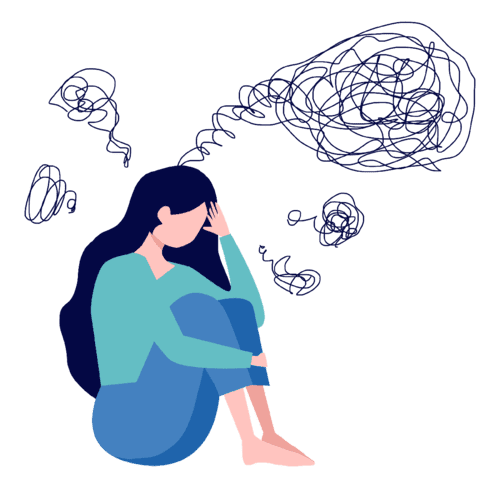Retroactive OCD Assessment
Free Retroactive OCD Assessment

What is Retroactive OCD Assessment
?
Retroactive OCD assessment involves reviewing past events, actions, or decisions with obsessive scrutiny, driven by obsessive-compulsive tendencies. Individuals with this subtype of OCD may ruminate intensely over past actions, seeking reassurance or analyzing whether they made mistakes. This can lead to distress and a sense of being trapped in a cycle of regret and doubt. Effective treatment often involves cognitive behavioral therapy, including exposure and response prevention, to help individuals manage these intrusive thoughts and break the cycle of compulsive reassessment.
Who can benefit from this Retroactive OCD Assessment?
A retroactive OCD assessment can benefit individuals who suspect they may have had undiagnosed OCD symptoms in the past. It is valuable for those seeking clarity about their past experiences and understanding the impact of potential obsessions and compulsions. This assessment helps validate personal insights, shed light on unrecognized patterns, and offer a sense of closure. Additionally, individuals who aim to gain deeper self-awareness or enhance ongoing OCD management can find value in retrospectively exploring their journey through an informed psychological lens. It empowers individuals to make sense of their history and inform their present and future well-being.
Retroactive OCD Assessment Accuracy
Retroactive OCD assessments can offer valuable insights, but accuracy can be influenced by memory biases and interpretation of past experiences. Recollections may not fully capture the intensity of obsessions and distress. Consultation with mental health professionals can enhance accuracy by combining retrospective information with clinical expertise, improving diagnosis and treatment planning.
Types of Retroactive OCD Assessment
Memory Reviewing:
This involves constantly reviewing past events to ensure that nothing wrong was done or that no harm occurred. The individual might replay conversations or actions over and over in their mind to ensure they didn’t make any mistakes.
Moral Scrupulosity:
Individuals with this subtype of retroactive OCD excessively review past decisions to ensure they align with their moral or ethical beliefs. They may feel extreme guilt or distress if they believe they’ve violated their moral code in any way.
Relationship Retroactive OCD:
This subtype involves obsessing about past interactions with others. The individual might repeatedly analyze conversations or actions, searching for any signs of offense or harm caused to the other person. They might worry that they have damaged the relationship.
Contamination Obsessions:
In this subtype, the individual obsesses about whether they have come into contact with something harmful or dirty in the past. They might review their actions and environments to ensure they didn’t inadvertently contaminate themselves or others.
Perfectionism and Reviewing:
Individuals might excessively review past work or actions to ensure they are perfect. They might worry about even minor errors and feel compelled to correct them, leading to a cycle of never feeling satisfied.
Seeking Reassurance:
People with retroactive OCD might seek reassurance from others, repeatedly asking if they remember certain events the same way. This can be an attempt to alleviate their doubts and anxieties.
Handling Retroactive OCD Issues
Retroactive OCD, also known as “retroactive jealousy OCD,” is a specific subtype of OCD where individuals become obsessed with their partner’s past relationships or experiences. This can lead to intense anxiety, intrusive thoughts, and compulsive behaviors related to the past. Here are some suggestions for handling retroactive OCD issues:
- Recognize the Obsession: Understand that retroactive OCD is characterized by intrusive and distressing thoughts about your partner’s past. These thoughts are irrational and don’t reflect the reality of your current relationship.
- Seek Professional Help: Consider working with a mental health professional who is experienced in treating OCD. Cognitive Behavioral Therapy (CBT), particularly Exposure and Response Prevention (ERP), can be effective in addressing retroactive OCD.
- Practice Mindfulness: Mindfulness techniques can help you stay present and reduce rumination about the past. Engaging in mindfulness meditation or grounding exercises can be beneficial.
- Challenge Irrational Thoughts: When you have intrusive thoughts, question their validity. Are these thoughts based on evidence, or are they fueled by anxiety? Challenge these thoughts with rational counterarguments.
- Limit Reassurance Seeking: Constantly seeking reassurance from your partner or others about their past can reinforce the OCD cycle. Try to reduce the urge to seek reassurance, as it can perpetuate the anxiety.
- Set Boundaries: Establish boundaries around discussing your partner’s past. Agree on what topics are off-limits in order to minimize triggers for your OCD.
- Exposure Therapy: Work with a therapist to gradually expose yourself to triggers related to your partner’s past, while resisting the compulsions (such as seeking reassurance or checking their past history). Over time, this can help reduce the anxiety associated with these triggers.
- Focus on the Present and Future: Concentrate on building a strong and healthy relationship in the present moment. Remember that your partner’s past doesn’t define your current relationship.
- Cultivate Self-Confidence: Build your self-esteem and self-worth independent of your partner’s past. Engage in activities that make you feel confident and accomplished.
- Journaling: Writing down your thoughts and feelings can help you gain perspective on your obsessions and compulsions. This can also be a helpful tool to share with your therapist.
- Practice Self-Compassion: Be kind and patient with yourself. OCD is a challenging condition, and it’s important to treat yourself with understanding and care.
- Medication: Consult a psychiatrist to discuss whether medication could be a helpful part of your treatment plan.
Remember that overcoming retroactive OCD can be a gradual process, and it’s okay to seek professional guidance and support. Working with a therapist who specializes in OCD treatment can provide you with the tools and strategies you need to manage your symptoms and improve your overall well-being.

